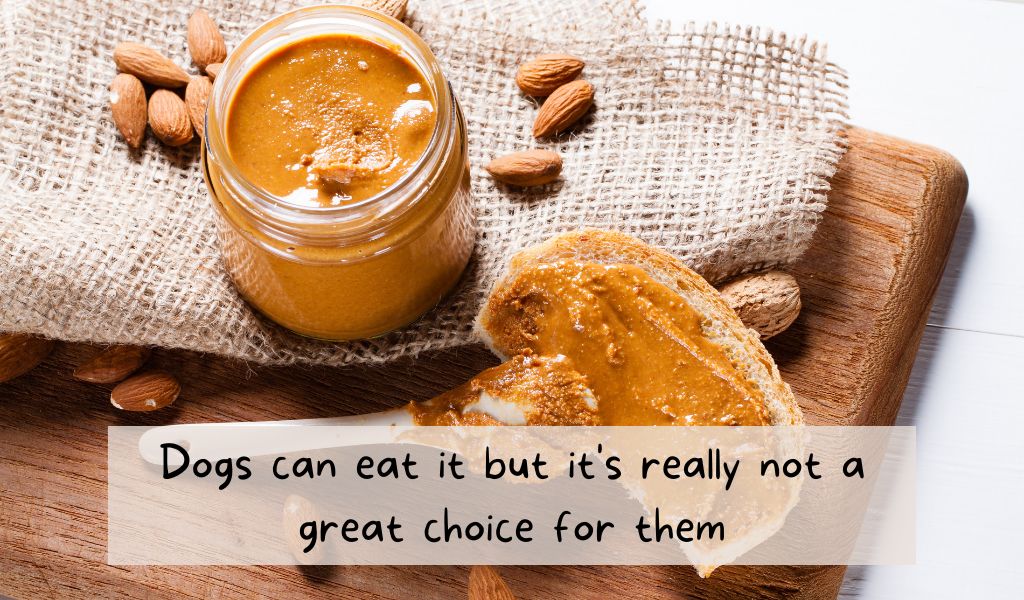Dogs are a part of the family for many people, and as such, pet owners want to make sure they are providing their pets with the best possible life.
This means feeding them right, exercising them regularly, and giving them plenty of love. It also means making sure they’re getting the proper nutrition, including supplements when necessary.
Some dog owners might be wondering if almond butter is a good option to give their pup as a supplement.
Let’s take a look at what almond butter is, what benefits it has for dogs, how to give it to your dog, and the risks associated with doing so.
Dogs can eat almond butter in small amounts. It contains a variety of vitamins and minerals that can be beneficial to a dog. However, almond butter should not be given regularly and should never be used as an alternative to dog food and a good, balanced diet.
What is almond butter and what are its benefits?
Almond butter is an alternative to other dairy and peanut butters, making it suitable for dogs with allergies or special dietary needs.
It is produced by grinding water-soaked almonds into a creamy, spreadable butter.
Almond butter is high in containing healthy fats and proteins, as well as ample vitamins and minerals like calcium, magnesium, phosphorus and zinc.
Not only can dogs benefit from these substances, dogs can enjoy almond butter just like humans do.
The texture of the butter makes it perfect for adding to treats or incorporate into meals.
Additionally the “nutty goodness” of almond butter increases the flavour pallette of dogs to keep them engaged while they eat.
Almond butter should never be used as a meal replacement though- instead it should be utilized as an occasional treat or topping.

Can dogs eat almond butter safely?
Dogs can eat almond butter in moderation as a treat.
Almond butter is much better than peanut butter given that dogs are more prone to suffering from aflatoxin, a known cancer-causing chemical found commonly in peanuts.
Although almond butter is nutritious and full of healthy fats, omega 6, and protein – dogs should only consume this treat sparingly because too much fat can affect their digestive system.
Before giving dogs almond butter, it’s important to make sure that the brand of almond butter doesn’t contain added sugar. salt or artificial additives or flavourings, all of which could potentially be dangerous for dogs.
All in all, dogs can enjoy small amounts of almond butter as an occasional treat.
Some varieties of almond butter contain Xylitol, an artificial additive that is toxic to dogs. Always check labels before giving human type foods to your dog.
Start out slow by giving small amounts at first, sudden changes in diet and new foods can upset a dog’s stomach.
If everything goes well, gradually increase the amount over time in portions. Furthermore, giving your dogs almond butter should not exceed 10% of their daily caloric intake.
And lastly, different dogs will have different tolerance levels when it comes to sweet treats such as almond butter so feed this treat sparingly.
What are the risks of giving your dog almond butter ?
Almond butter may have many benefits for dogs, however, it is important to be aware of the potential risks associated with it.
All dogs have different dietary needs and sensitivities and certain dogs may have allergic reactions to almonds, including vomiting or diarrhea.
Additionally, almond butter can contain large amounts of xylitol, an artificial sweetener which dogs unfortunately cannot metabolize correctly.
Xylitol can cause slight symptoms such as vomiting but it can also cause major liver damages in dogs if a substantial amount is eaten.
When feeding dogs almond butter treats, owners should always research the product for any additives and make sure to create an appropriate portion size when giving their dog the treat.
Should I feed almond butter to my dog?
It’s important to ask yourself why you would want to feed almond butter to your dog.
Your dog does best on quality dog food that is well balanced and, although dogs can eat almond butter, the reality is why would you feed it?
It is not a natural food for canines and, if your dog has a good diet, he does not need this type of product.
Almond butter is high in calories and fat, which can cause digestive problems and weight gain if your dog eats too much of it.
It should only be given as a treat in moderation, not as a meal replacement or the main source of nutrition.
Alternatives to almond butter for dogs
Peanut butter without sugar or xylitol is a classic stand-by, as dogs often find it tantalizing.
Similarly, pumpkin seed and cashew butters make great choices that dogs also love.
Sunflower seed butter is another option – choose one with added vitamins and minerals for extra health benefits for your pup.
Coconut butter has many health benefits, and dogs arguably love the taste even more than other nut butters.
Be wary of adding any extras like honey or chocolate – dogs can be sensitive to these sweet treats and may experience indigestion if given too much.
Whichever option you choose strive to select an organic variety made with minimal ingredients.
Give healthy dog treats instead
Final Words
Overall, almond butter can be a great treat for dogs, but should only be given in moderation.
Owners should always research the product and make sure it doesn’t contain any extra ingredients that could potentially be dangerous.
If you decide to give your dog almond butter as a treat, break up the portion size into smaller pieces to avoid overfeeding them.
Additionally, there are plenty of alternatives to almond butter available that offer similar benefits and can provide occasional treats for your pet.










